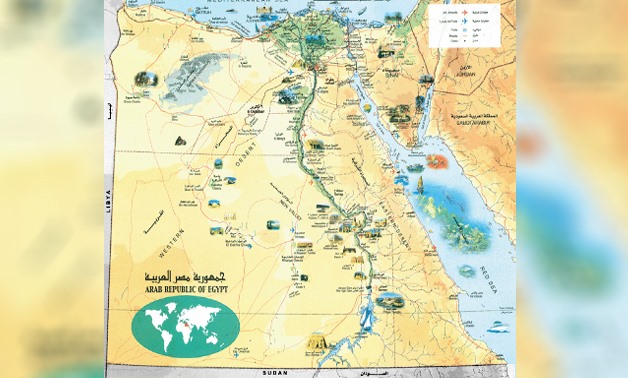
Egypt asserted its complete rejection of the Sudanese reports and announced it would deliver a letter to the U.N. Secretariat in protest to Sudan’s allegation of sovereignty over Hala’ib and Shalateen – CC via IDSC/Mohamed Farid
CAIRO – 23 December 2017: Media outlets reported a rejection made by Sudan's Foreign Ministry to the maritime border demarcation agreement between Egypt and Saudi Arabia, threatening to address the issue at the United Nations.
Egypt asserted complete rejection of the Sudanese reports and announced it would deliver a letter to the U.N. Secretariat in protest to Sudan’s allegation of sovereignty over Hala’ib and Shalateen, Foreign Ministry spokesperson Ahmed Abou Zaid said on Thursday.
Hala’ib and Shalateen, or the Hala’ib Triangle, is an area of land measuring 20,580 square kilometers, located at the Egyptian-Sudanese border on the Red Sea coast. It is part of the Red Sea governorate and consists of three major towns – Hala'ib (which became a city in February 2014), Abu Ramad and Shalateen.
The area belongs to Egypt politically and administratively, but has been one of the major sticking points in Egyptian-Sudanese relations since the demarcation of borders between the two countries carried out during the British occupation of Egypt in 1899, at a time when Sudan was part of the Egyptian Kingdom.
The issue drew attention after Hala'ib and Shalateen declared electoral constituency in both Sudan and Egypt in 2014.
Sudan allegedly made military moves near Hala'ib and Shalateen on the Egypt-Sudan border in March. The move came weeks after a televised interview with Saudi satellite channel Al-Arabiya, in which Sundanese President Omar al-Bashir, who is wanted by the International Criminal Court for war crimes, threatened to resort to the U.N. Security Council to give its settlement over its claimed sovereignty over the triangle.
After the signing of an agreement delineating the maritime border between Egypt and Saudi Arabia in April 2016, Sudan raised the issue once again, demanding Egypt either engage in direct negotiations over the area or take the issue to international arbitration. Cairo rejected the proposal and stressed that the triangle is Egyptian territory and that it will not negotiate or resort to international arbitration on the matter.
According to Al Arabiya Institute for Studies, the Sudanese administration of Hala'ib and Shalateen was temporary and neither grants Sudan the right to rule the area, nor denies Egypt's sovereignty over any part of the territory.
Egypt affirms that it has never concluded any international treaties or agreements, whether with Britain or Sudan, to give international status to the demarcation of administrative borders.
The largest tribes inhabiting the Hala'ib Triangle, including Rashaida, Alababdeh and Bashaira, who rejected the Sudanese National Election Commission's decision granting people in Hala'ib the right to participate in Sudanese general elections. The three tribes asserted during their participation in the 6th October War victory celebration in 2009 that the area is 100 percent Egyptian.
Development of Hala’ib Triangle
Red Sea Governor Ahmed Abdullah said on Thursday that the government has carried out a comprehensive development program worth LE 3 billion ($167.9 million) in the Hala’ib and Shalateen area.
He added that the program included infrastructure projects, houses of worship, schools, and cultural and youth centers to attract investments to the area.
The Red Sea governorate, in cooperation with the Slums Development Fund, has completed the construction of a large number of housing units at a cost of LE 970 million, Abdullah said.
It should be noted that state employees who work in the Hala’ib Triangle receive a 300 percent incentive as well as free public facilities, including electricity and water. In addition, students in Hala’ib schools receive LE 5 pocket money daily from the government.
Diplomatic initiatives
Despite the common bonds of history, language and religion between the two Nile River neighbors, Egypt and Sudan’s diplomatic relations have been frosty recently due to various reasons, mainly the Hala’ib issue. The two countries have been engaged in high-level diplomatic initiatives to improve their relations.
Egypt’s Foreign Minister Sameh Shoukry has visited the Sudanese capital Khartoum twice this year, with the goal of restoring strong, longstanding ties between Khartoum and Cairo. Relations had withered after July 2013, when former Muslim Brotherhood-affiliated President Mohammed Morsi was ousted.
In April 2017, the Joint Sudan-Egypt Committee for Political Consultation convened in Cairo and signed a media charter of honor and a commitment to continue consultations on arising political issues between the two countries.
In the same month, Shoukry and his Sudanese counterpart Ibrahim Ghandour agreed to work together to control the ongoing hostility in the news media in both countries caused by the mounting political tensions between the two neighbors.


Comments
Leave a Comment